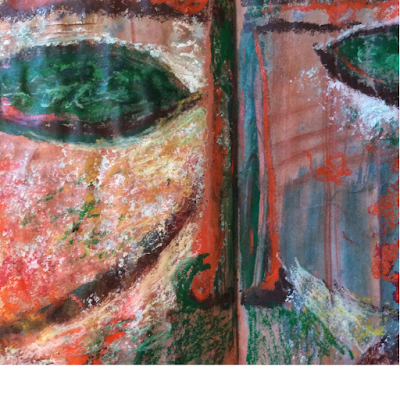Evaluation of Completed Work
The complete embroidered assessment piece for Module Four is a maze or fold book based on the design topic of line and texture in media, which is inspired by the concept of blogging.
Do you feel satisfied with the results?
Yes, I am pleased with it.
If yes, which parts in particular?
Since the beginning I tried hard to work at this piece as a whole and not at its single elements through all the designing and making steps and I feel that I was successful in this effort of being consistent with my initial idea.
Is it fit for its purpose?
In my opinion it is fit, since I believe it is a fairly adequate representation of the blogosphere.
If you were asked to make it again, what changes would you make?
1) To the way you designed it:
I would try to create a more multi-dimensional piece, perhaps by having more than one book intersecting and crossing on different planes, both vertically and horizontally, like a complex castle of cards.
2) To the way you made it:
I would strive for a visually lighter and immaterial effect by using transparent materials in a more consistent way.
COSTING OF THE EMBROIDERED SAMPLE:
| Lutradur and Vilene interfacing | 10 Euros |
| Fabrics | old and recycled fabrics (3 Euros) |
| Papers | recycled |
| Threads | 5 Euros |
| Temporary fabric adhesive | 3 Euros |
| Fishing monofilament | 0,5 Euros |
| Silk paints | 3 Euros |
TIMING OF THE EMBROIDERED SAMPLE:
Design work was started on 25 October 2010 and completed on 12 November 2010.
Embroidery work was started on 18 November 2010 and completed on 20 January 2011.
Total hours working on design: 8 hours plus thinking time
Total hours working on embroidery: 31 hours plus thinking time
STORAGE OF WORK, MATERIALS, TOOLS AND EQUIPMENT
| Item | My storage place |
| Design work in progress | shoe box with lid |
| Completed work in progress | flat in big plastic box with lid together with all material prepared for Module Four |
| Papers for design work | flat in card box |
| Inks and paints for design work | wooden box, upright, in cool and dark conditions |
| Other items like glue, bleach, sprays | on my working table in my workroom |
| Embroidery work in progress | plastic bags in a plastic box |
| Fabrics | plastic containers arranged in like colours, behind a curtain that keeps light out |
| Threads | drawers, arranged in like colours, beside the sewing machine |
| Beads, metal threads etc. | Small air-tight boxes, drawers, bags |
| Dyes, paints etc. | closed cabinet in my workroom |
| Sewing machine | on small table beside a window in my workroom, in working position |
| Other electrical equipments | iron upright on a top shelf, small electrical appliances in their original boxes |
HEALTH AND SAFETY RULES OBSERVED IN MODULE FOUR
Items and working processes that have been used in Module Four:
- inks, acrylic paints, silk paints, fabric dyes, wax crayons, oil pastels, brushes
- natural and synthetic fabrics, meshes, grids
- hand and machine threads
- wooden, metal and plastic frames
- paper-making items: recycled paper, liquidizer, rigid mesh, old towels, kitchen cloths, plastic bowl
- soldering iron and stand
- cutter and self-healing mat
- laundry iron
- sketchbook/cartridge paper, PVA glue, fabric adhesive spray
- Lutradur, Vilene interfacing.
Which working processes need special care and attention to protect yourself, your environment and your own work?
- Always lay the soldering iron on its stand and beware to not touch the tip
- Wear a fine powder mask when using powder dyes
- Always work in a well ventilated room when using sprays and bleach and melting synthetic fabrics
- When using a naked flame always tie your hair and do not wear synthetic fabrics
- Keep electrical flexes out of your way, not loose on the floor
- Always use your cutter on a self-healing mat and keep moving the blade away from you


Hi Daniela, I loved your finished piece, it is really lovely and thankyou so much for introducing Pablo Lehmann to me!
ReplyDelete